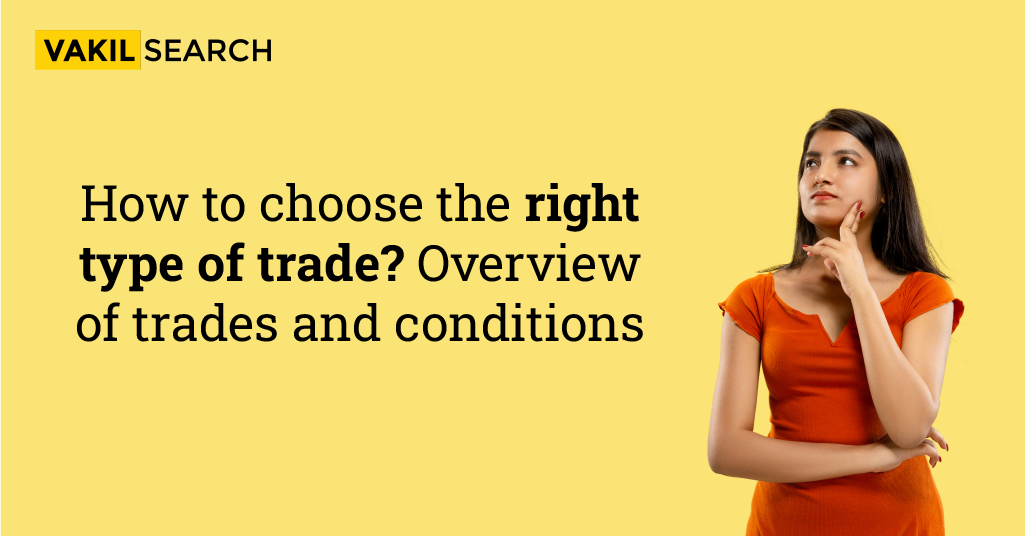Do you want to start a trading business? Here are the important trade types you must know before you start the business. Also, some other important tips are explained. Learn everything about how to choose the right type of trade. Overview of trades and conditions.
The traders use different strategies per their convictions and market knowledge. The trade issue is that the strategy or method which is successful for one trader may not be the same for another, which is why traders employ distinct trading strategies. Due to the advancements in financial technology, there have been many innovations in trading. Now, traders worldwide have more options to pick their preferred trading style. This article will highlight how to choose the right types of trade.
What is Trade? – An Overview
Trade is the exchange of products or services between various economic actors. Because both parties are not obligated to exchange goods or services, a trade can only occur when they believe it is beneficial to their interests.
Trade may have different definitions in various contexts. In financial markets, trading is acquiring and selling commodities, securities, or derivatives. Free trade is the international exchange of services and goods, free of tariffs or other trade barriers.
Important Information to Know Concerning Trading
- Trade is the exchange of services or products between two economic actors
- Because transactions are consensual, trade is usually regarded as in both parties’ best interest
- The term “trading” in finance refers to selling and purchasing assets like securities and others
- Regarding international commerce, comparative advantage suggests that trade will benefit everyone involved
- The majority of classical economists support free trade. However, certain development economists believe that there are benefits to protectionism
What Are the Various Types of Trades?
Scalping
The trade where trading “scalps” some profit on each trade, taking advantage of the bid-ask spread and changing the direction of stocks or other asset classes several times throughout the day means scalping. Traders do it to earn an unspecified profit from each trade, adding to the large sum at the close each day.
Swing Trading
Swing traders keep their positions for more than one day. Fundamentalists tend to be swing traders since changes to corporate fundamentals generally take months or days to create enough price movements for the trader to earn an acceptable profit.
Internal Trade
The type of trade is carried out inside the country of origin, within the same geographic boundary of a nation. In normal business language, we call it domestic trade. Trade between traders in Kolkata, Ahmedabad, Chennai, Pune, Mumbai, etc., is an example of intra-regional trade.
Retail Trade
Retail trade is the process of selling products directly to consumers through retailers. Typically, retailers purchase products from wholesalers before selling them directly to customers.
The retailer acts as an intermediary between wholesalers and a consumer. They generally offer goods in smaller quantities. The other types of internal trade include Local Trade and State Trade.
External Trade
The word “external” itself signifies that trade is conducted between two nations on the world stage. Sometimes, it’s popular as an international trade name, meaning that both the seller and buyer reside in two nations. Trade between countries is further divided into various types.
Import Trade
This trade type is buying products or services produced by different countries. Import and export of goods from a different country are referred to as import trade.
Export Trade
It sells manufactured goods made in the country to a foreign country. Exporting products to another country is referred to as export trade. When products imported from a specific country are re-exported to buyers in a different country, we call it an entrepot trade or re-export trade.
Momentum Trading
Momentum traders look for shares that move in one direction, in large volume. They try to exploit the momentum for the desired amount of profit.
Technical Trading
Technical traders concentrate on graphs and charts. They study the lines of stock or index graphs for indications of convergence or divergence, which could indicate sell or buy signals.
Day Trading
It’s the act of purchasing and selling financial instruments on the same trading day or perhaps several times during the day by taking advantage of minor price fluctuations.
In-the-day scalping and trading offers traders the opportunity to leverage trades and earn more than normal. The leveraged trading strategy is also why almost all intraday traders don’t succeed over a long time.
Fundamental Trading
Fundamentalists invest in companies based on fundamental analysis that examines corporate events, specifically future or actual earnings reports, re-organisations, stock splits, or acquisitions.
What Is a Trade Permit?
A trade license is a certificate issued to an applicant seeking to open a business permitting him/her/them to commence business in a given area/location within the particular municipal/corporation limit. The license allows the applicant to begin and run the business as stated on the form. Suppose the applicant plans to start a different business from the one mentioned in the application for the trade license. In that case, it is necessary to segregate it.
How to Apply for Trade License in India ?
Suppose you want to apply for a trade license in Gujarat. In that case, it includes drafting your application. You must submit a similar form to the concerned department in the municipality corporation available in Gujarat. It should be where you want to start your trading business. The application needs submission with the following documents required for obtaining a trade license:
- Lease documents/property owner consent
- Incorporation Certificate (for LLP/firm/registered organisation)
- Occupancy certificate.
- PAN card (for firm/LLP/registered company)
- Aadhar card (for individual applicants)
- Receipt of recent property tax payment to the Municipality
- Layout plan of the business, including working/washing areas (certified)
- Sanctioned plan
- No Object Certificate from the closest neighbors of the business premises
The period of validity for the trade license is for 1-year. Processing a trade license application generally takes seven to ten working days. Additionally, any trade licenses that you get require renewal during the time period between January 1st and March 31st. The application to extend the validity of the license should be filed at least thirty days before the expiration date.
Conclusion
This blog addressed the many kinds of trading, according to popularity and profits. If you’re looking to become successful, the trading strategy is largely linked to your mental outlook, which depends on several variables. Contrary to a system of trading that can handle several kinds of trades simultaneously, traders will certainly not be able to make money from tested trades if they diverge from the fundamentals of the individual trader’s personality.
Read more,










